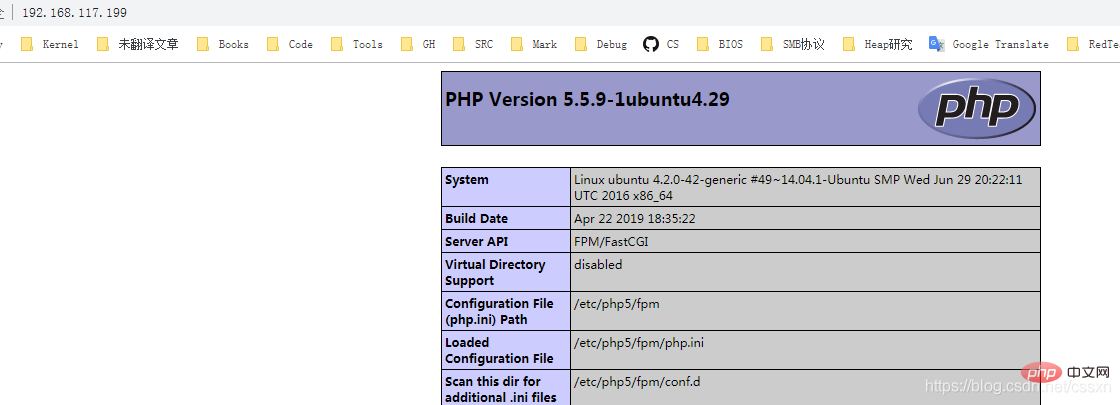Maison >développement back-end >Problème PHP >Que dois-je faire si le port php 9000 ne démarre pas ?
Que dois-je faire si le port php 9000 ne démarre pas ?
- 藏色散人original
- 2022-01-17 09:55:3110789parcourir
Solution au port PHP 9000 qui ne démarre pas : 1. Recherchez "php5/fpm/pool.d/www.conf" ; 2. Remplacez l'écoute par "127.0.0.1:9000" ; 3. Remettez nginx sur le port utilisé. Surveillance 4. Redémarrez nginx et php-fpm.

L'environnement d'exploitation de cet article : système Ubuntu 16.04, PHP version 7.1, ordinateur DELL G3
Que dois-je faire si le port php 9000 n'est pas démarré après le démarrage de php-fpm, le port 9000 ne démarre pas ? apparaître ?
Récemment, je reproduis une porte dérobée d'extension php, qui nécessite la mise en place d'un environnement Nginx+php. J'ai installé nginx nu à partir du code source sans aucun module tiers.
php-cli et php-fpm sont installés via la commande apt-get standard d'Ubuntu.
Ensuite, vous devez modifier le fichier nginx.conf de nginx pour prendre en charge l'analyse des scripts php.
Après vérification, il existe deux configurations sur Internet. L'une est
prend en charge 127.0.0.1:9000
location ~ \.php$ {
root html;
fastcgi_pass 127.0.0.1:9000;
fastcgi_index index.php;
fastcgi_param SCRIPT_FILENAME /usr/local/nginx/html/$fastcgi_script_name;
include fastcgi_params;
}
L'autre consiste à utiliser des fichiers sock
location ~ .php$ {
root /usr/share/nginx/html;
fastcgi_pass unix:/var/run/php-fpm/php5-fpm.sock;
fastcgi_index index.php;
fastcgi_param SCRIPT_FILENAME $document_root$fastcgi_script_name;
include fastcgi_params;
}
Je viens de commencer à utiliser la première méthode de port 9000 pour la configuration, PHP. analyse Non, après avoir vérifié le journal php-fpm, j'ai découvert qu'il y avait une sock
[17-Sep-2019 00:23:02] NOTICE: fpm is running, pid 5617 [17-Sep-2019 00:23:02] NOTICE: ready to handle connections [17-Sep-2019 00:23:02] NOTICE: systemd monitor interval set to 10000ms [17-Sep-2019 00:31:28] ERROR: An another FPM instance seems to already listen on /var/run/php5-fpm.sock [17-Sep-2019 00:31:28] ERROR: FPM initialization failed [17-Sep-2019 00:37:34] NOTICE: configuration file /etc/php5/fpm/php-fpm.conf test is successful
. Ensuite, je suis passé au deuxième mode d'interaction du fichier sock dans le fichier de configuration nginx et j'ai constaté que la page ne pouvait toujours pas être analysée.
Enfin, trouvez le fichier de configuration /etc/php5/fpm/pool.d/www.conf et modifiez l'écoute en 127.0.0.1:9000
Remettez nginx en écoute du port, et redémarrez nginx et php-fpm, enfin le php le script peut être analysé. .
root@ubuntu:/usr/local/nginx# netstat -tln Active Internet connections (only servers) Proto Recv-Q Send-Q Local Address Foreign Address State tcp 0 0 127.0.0.1:9000 0.0.0.0:* LISTEN tcp 0 0 127.0.0.1:3306 0.0.0.0:* LISTEN tcp 0 0 0.0.0.0:80 0.0.0.0:* LISTEN tcp 0 0 127.0.1.1:53 0.0.0.0:* LISTEN tcp 0 0 127.0.0.1:631 0.0.0.0:* LISTEN tcp6 0 0 ::1:631 :::* LISTEN root@ubuntu:/usr/local/nginx# pgrep nginx|xargs kill -s 9 root@ubuntu:/usr/local/nginx# vim conf/nginx.conf root@ubuntu:/usr/local/nginx# sbin/nginx root@ubuntu:/usr/local/nginx#
fichier de configuration nginx.conf
server {
listen 80;
server_name localhost;
root html;
index index.php;
location ~\.php$ {
fastcgi_pass 127.0.0.1:9000;
fastcgi_index index.php;
fastcgi_param SCRIPT_FILENAME $document_root$fastcgi_script_name;
include fastcgi_params;
}
/etc/php5/fpm/pool.d/www.conf lieu de modification du fichier :
; The address on which to accept FastCGI requests. ; Valid syntaxes are: ; 'ip.add.re.ss:port' - to listen on a TCP socket to a specific address on ; a specific port; ; 'port' - to listen on a TCP socket to all addresses on a ; specific port; ; '/path/to/unix/socket' - to listen on a unix socket. ; Note: This value is mandatory. listen = 127.0.0.1:9000

Apprentissage recommandé : "Tutoriel vidéo PHP 》
Ce qui précède est le contenu détaillé de. pour plus d'informations, suivez d'autres articles connexes sur le site Web de PHP en chinois!

